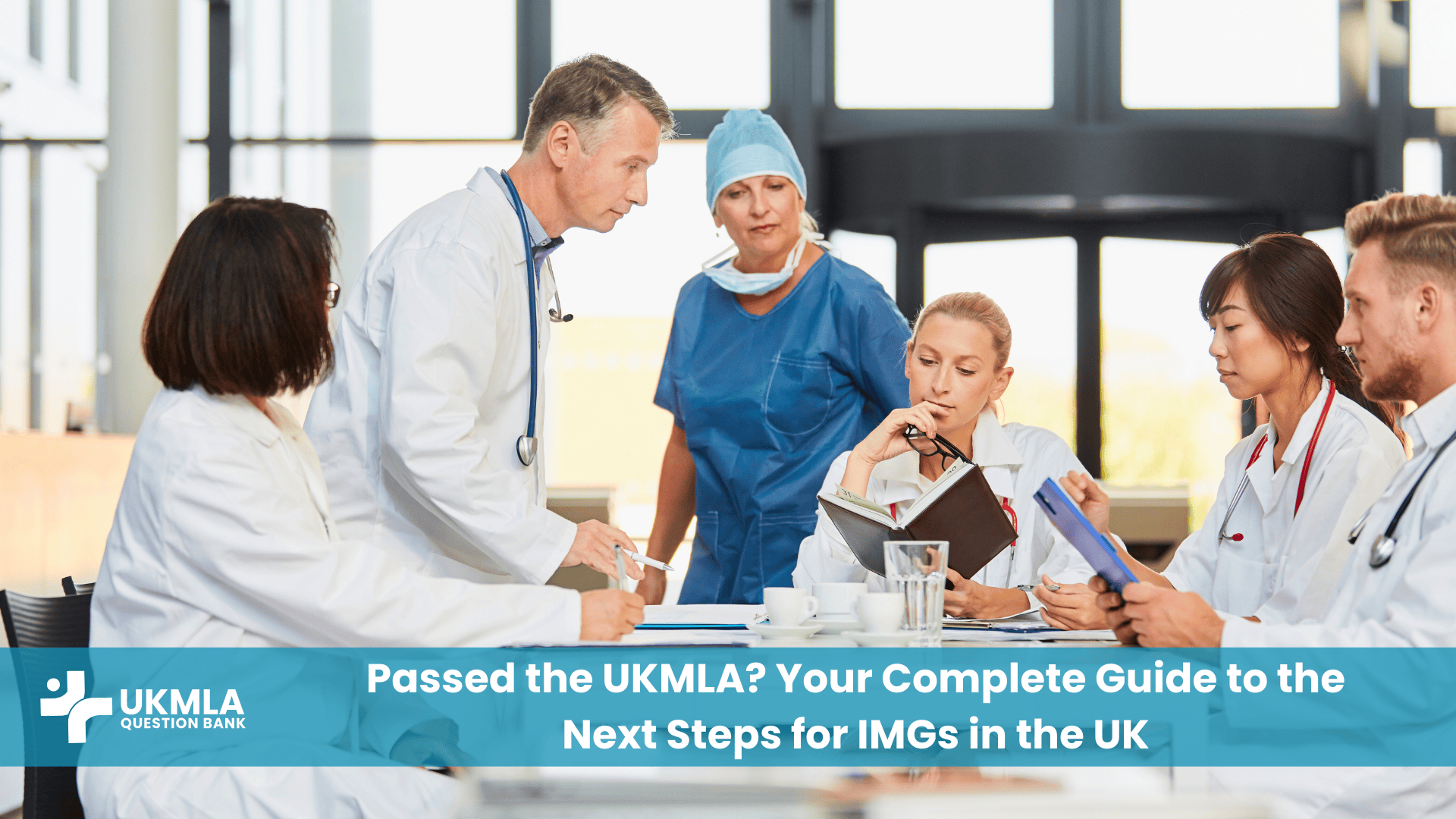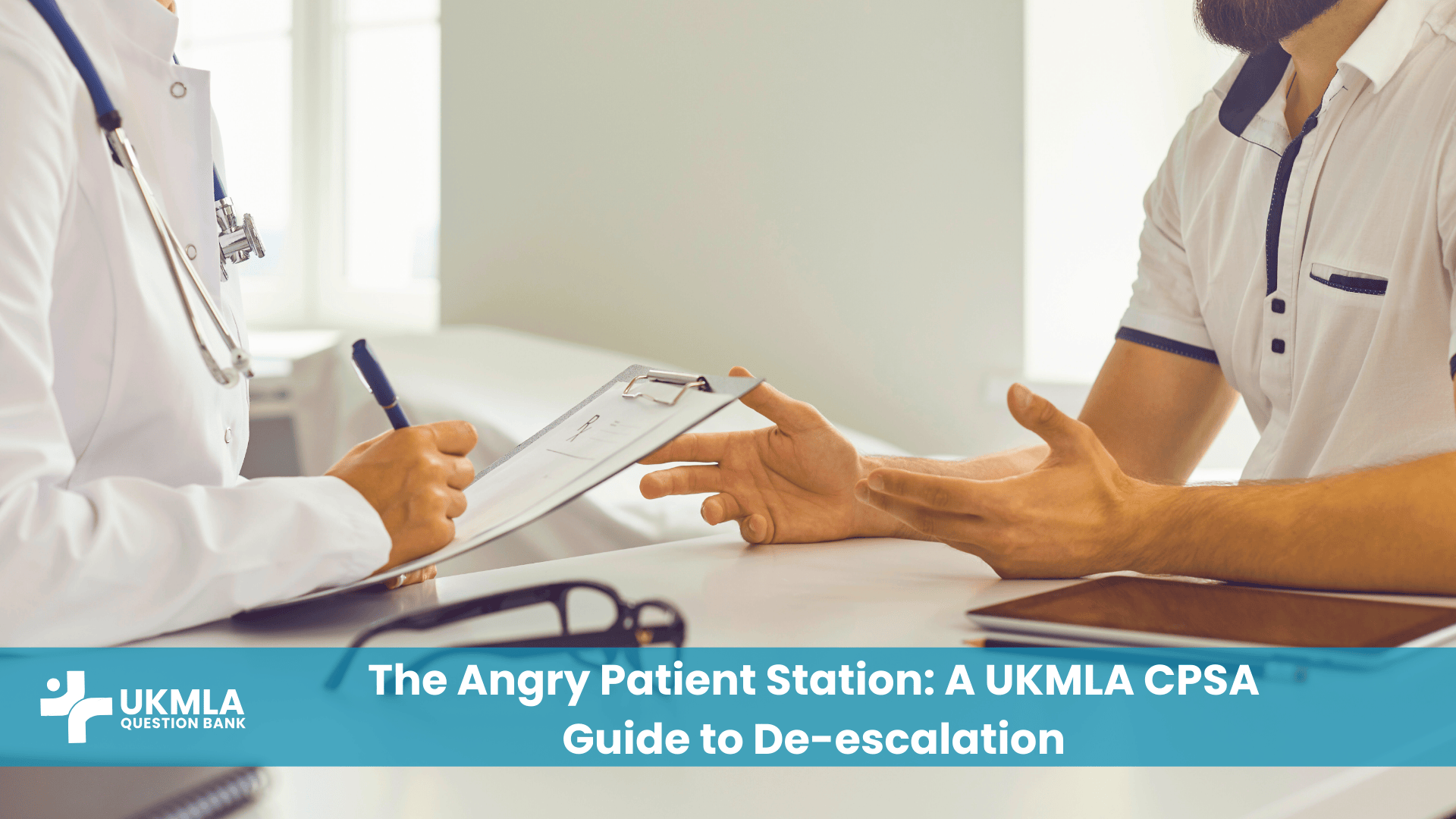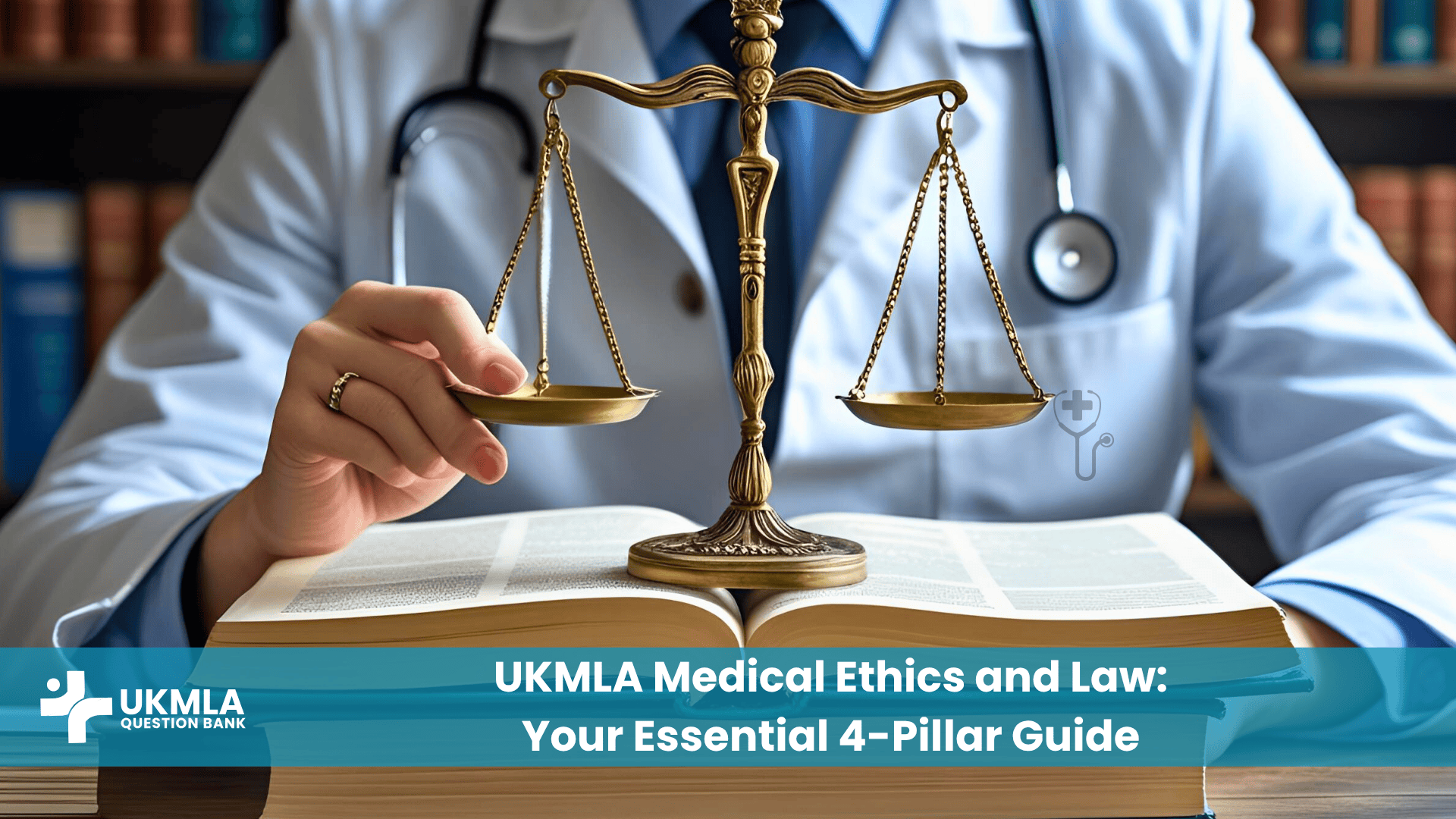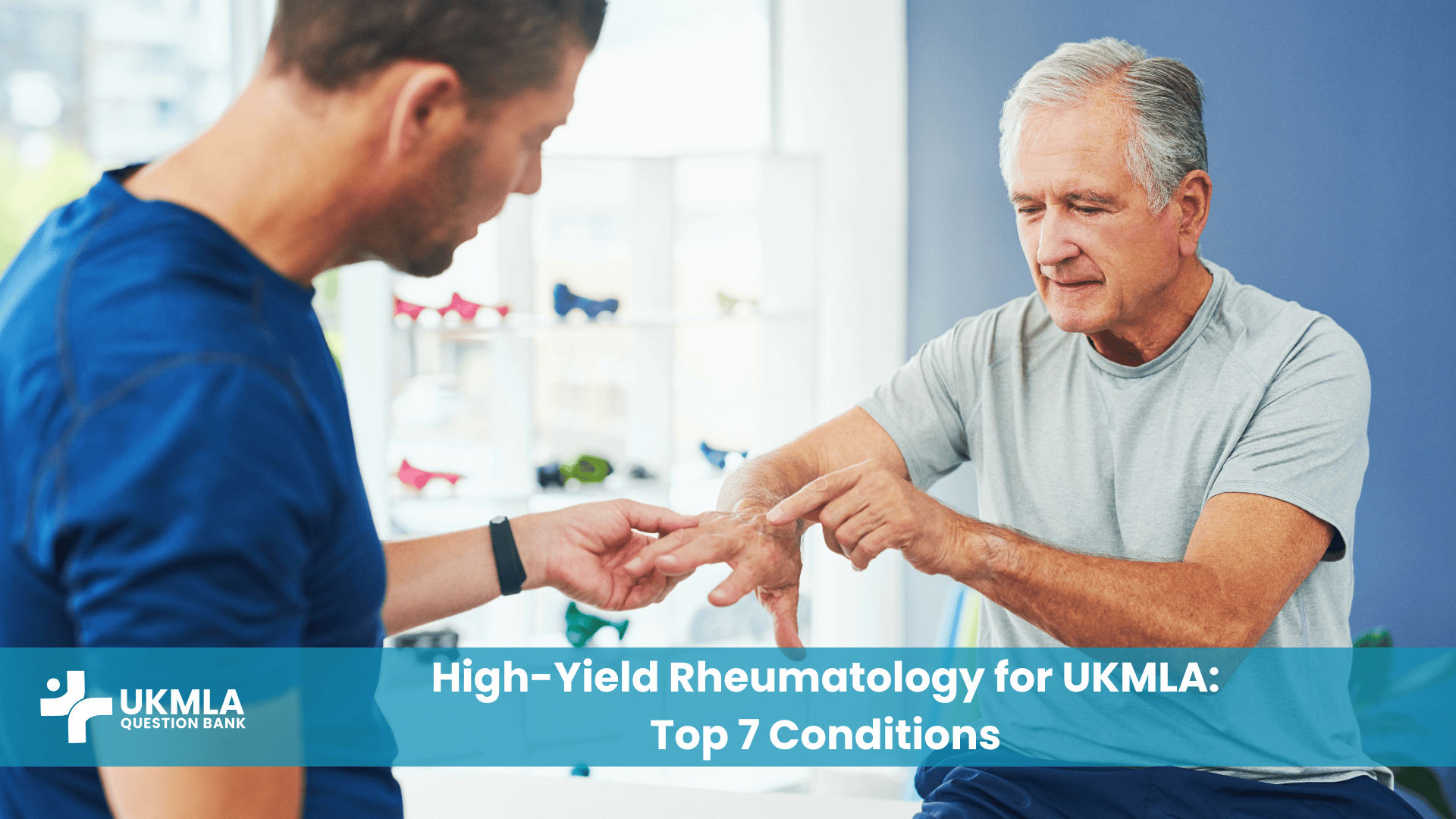Introduction
The next steps for IMGs after UKMLA success represent the beginning of an exciting and pivotal new chapter in your medical career. Having navigated the rigorous preparation and passed the exam, you have officially demonstrated that you have the knowledge and skills to practise safely in the UK. This is a monumental achievement, a testament to your dedication, resilience, and clinical acumen. You’ve conquered the final academic hurdle, and the path to becoming a UK doctor is now clearly laid out before you.
This guide is designed to be your comprehensive roadmap for what comes next. While our UKMLA for IMGs: Step-by-Step Guide helped you get to this point, this article focuses on the crucial administrative, professional, and practical stages that follow. We will walk you through everything from formalising your results to stepping into your first NHS role, ensuring you can navigate the process with confidence and clarity.
Table of Contents
ToggleThe Core Next Steps for IMGs After UKMLA: A 5-Step Guide
Step 1: Verify Your Results & Celebrate Your Success
The first thing to do is officially access and verify your UKMLA results. The General Medical Council (GMC) will provide these through the GMC Online portal, the same platform you used for registration. You will receive an email notification prompting you to log in and view your outcome. Ensure you save a digital and physical copy of your results notification for your records.
Before you get swept up in the whirlwind of applications and paperwork, it’s absolutely crucial to pause. Take a moment—a day, a weekend—to celebrate this incredible achievement. You have invested countless hours, made significant sacrifices, and overcome a challenging exam. Acknowledging your hard work is vital for your well-being and helps you recharge for the administrative journey ahead. Don’t underestimate the importance of this step.
Step 2: The GMC Registration Pathway for IMGs
With your UKMLA pass secured, the next major milestone is gaining registration with the GMC. This is the official licence that permits you to practise medicine in the UK. The process is detailed and requires meticulous attention to your documentation.
Understanding the Core Requirements
To apply for full registration, you will need to provide evidence that you meet a set of core requirements. Your UKMLA pass satisfies the knowledge and skills component, but you will also need to prove your identity, provide your primary medical qualification (PMQ), demonstrate your English language proficiency, and supply a certificate of good standing.
GMC Guidance: “Your application for registration is our primary way of checking you have the necessary knowledge, skills and experience to practise medicine in the UK. We must be satisfied you meet the requirements of the Medical Act 1983.”
For more granular detail on this specific topic, our dedicated article on GMC Registration for IMGs after UKMLA is an essential resource.
EPIC Verification: Your Primary Source Verification
Before the GMC will assess your PMQ, it must be verified by a trusted third party. The Electronic Portfolio of International Credentials (EPIC), a service provided by the Educational Commission for Foreign Medical Graduates (ECFMG), is the designated body for this.
The process involves:
Creating an EPIC Account: Register on the EPIC website.
Uploading Your PMQ: Submit a high-quality scan of your medical diploma or certificate.
Verification Request: EPIC will then contact your medical school or the relevant institution to confirm the authenticity of your qualification directly. This process can take several weeks, so it is highly recommended to start it as soon as possible, even before you have all other documents ready.
Submitting Your Application on GMC Online
Once your PMQ is verified via EPIC, you can proceed with your application on the GMC registration application guides portal. You will need to complete the application form and upload all your supporting evidence.
Table 1: GMC Registration Document Checklist for IMGs
| Document Category | Specific Requirement | Key Details |
| Identity | Valid Passport | Must be current and provide a full, clear copy. |
| Primary Medical Qualification | PMQ Diploma/Certificate | Must be verified by EPIC. |
| English Language | IELTS / OET Certificate | Must meet the GMC’s minimum scores and be less than two years old. |
| Professional Standing | Certificate of Good Standing | From every medical regulatory authority you’ve been registered with in the last 5 years. |
| UKMLA Pass | Results Notification | Automatically linked to your GMC account. |
After submitting, the GMC will assess your application. If everything is in order, you’ll be invited to an in-person identity check in the UK.
Step 3: Securing Your Visa & Right to Work in the UK
Once you have your GMC registration, or are confident it is imminent, you need to secure your right to work in the UK. For most IMGs, this means applying for a Health and Care Worker visa.
The Health and Care Worker Visa Explained
This visa category is specifically designed for qualified doctors, nurses, and other health professionals who have a job offer from an approved employer, such as the NHS. The key benefits include a faster application process, reduced fees, and an exemption from the Immigration Health Surcharge.
To be eligible, you must have a Certificate of Sponsorship (CoS) from an NHS Trust or another approved employer. This means you must secure a job offer before you can apply for the visa.
Gathering Your Documentation
The visa application requires a specific set of documents to prove your identity, qualifications, and the legitimacy of your job offer. Being organised here is critical to avoid delays.
Table 2: Health and Care Worker Visa – Key Documents
| Document | Purpose | Important Note |
| Certificate of Sponsorship (CoS) | Proves you have a valid UK job offer. | This is a reference number, not a physical certificate. |
| Proof of English Language Skills | Meets Home Office requirements. | Your OET/IELTS for GMC usually satisfies this. |
| Valid Passport | Proof of identity and nationality. | Must have at least one blank page for the visa. |
| Tuberculosis (TB) Test Results | Required if you are from a listed country. | The test must be from an approved clinic. |
| Criminal Record Certificate | Required for you and any adult dependents. | From any country you’ve lived in for 12+ months in the last 10 years. |
Step 4: Preparing for and Finding Your First NHS Job
With registration and visa pathways clear, the next focus is your job search. The NHS is a vast organisation, and understanding its recruitment process is key to your success. This is an excellent time to consult a broader NHS guide for IMGs to understand the system you are about to enter.
Crafting a Medical CV Tailored for the NHS
An NHS-style CV differs from a standard academic CV. It should be concise (typically 2-3 pages), clear, and focused on your clinical experience, audits, and competencies. Use headings that align with NHS job descriptions, such as ‘Clinical Experience’, ‘Audit & Quality Improvement’, ‘Teaching Experience’, and ‘Management & Leadership’. Always tailor your CV to highlight the skills mentioned in the specific job’s person specification.
Navigating NHS Jobs and Trac
The central hub for almost all NHS vacancies is the official NHS Jobs website. You’ll need to create a profile and complete a detailed online application form. Many NHS Trusts use a system called Trac to manage applications, so familiarise yourself with this interface. Set up alerts for relevant specialties and grades (e.g., ‘FY2 Level’, ‘ST1/CT1 Level’, ‘Trust Doctor’) to stay updated on new openings.
For some IMGs, an alternative route into the NHS is through the formal training pathway via the UK FPAS Application Guide. It’s worth researching if you are eligible and if this aligns with your career goals.
Preparing for NHS Interviews
NHS interviews are typically structured as a panel interview. They focus on assessing not just your clinical knowledge but also your understanding of clinical governance, patient safety, communication skills, and your commitment to NHS values.
Pro Tip: Prepare for your interview by reviewing the GMC’s ‘Good medical practice’ guidelines and reflecting on your own experiences. Use the STAR method (Situation, Task, Action, Result) to structure your answers to competency-based questions.
Be ready to discuss your portfolio, talk through challenging clinical scenarios, and explain why you want to work for that specific NHS Trust.
Step 5: Practical Relocation & Onboarding
The final phase involves the practicalities of moving to the UK and starting your new role.
Arranging UK Accommodation
Many hospitals offer temporary accommodation for new doctors, which can be a lifesaver for your first few weeks. Check with the hospital’s HR or medical staffing department once you have a job offer. Websites like Rightmove and Zoopla are the main portals for private rentals, but be aware that you will often need proof of income and a UK bank account.
Setting Up a UK Bank Account & Finances
Opening a UK bank account can sometimes be challenging without proof of address. Some banks have specific packages for key workers moving to the UK. It is wise to bring enough funds to cover your first month’s expenses, including a deposit for accommodation and living costs, as your first salary payment may take a few weeks.
Your First Days in the NHS: The Induction
Your new job will begin with a Trust induction. This is a mandatory orientation period where you will learn about the hospital’s policies, IT systems, safety protocols, and complete essential training. It’s a fantastic opportunity to meet fellow new starters, ask questions, and familiarise yourself with your new working environment before you step onto the wards.
Frequently Asked Questions (FAQ) about Post-UKMLA Steps for IMGs
Your pass in the UKMLA Applied Knowledge Test (AKT) is typically valid for two years when applying for GMC registration.
Yes, you can and should. Most job applications will ask for your GMC number or state that you are in the process of applying. A job offer is often conditional upon you successfully obtaining full GMC registration.
A CoS is a unique reference number issued by an approved employer (like an NHS Trust) that you need to apply for your Health and Care Worker visa. It confirms that you have a genuine job offer.
It varies significantly depending on individual circumstances and how quickly your documents (especially EPIC verification) are processed. A realistic timeframe is 3-6 months from starting the process to receiving registration.
Yes. For the Health and Care Worker visa, a confirmed job offer and the resulting Certificate of Sponsorship are mandatory prerequisites for the application.
A training post (e.g., FY2, CT1, ST3) is part of a formal, structured training programme that leads to a Certificate of Completion of Training (CCT). A trust-grade (or clinical fellow) post is a service role that is not part of a formal training programme, but it is an excellent way for IMGs to gain valuable NHS experience.
They can be, but they often overlap. If you have met the GMC’s requirements with IELTS or OET, this is usually sufficient to prove your English proficiency for the visa application as well.
It’s wise to have at least £2,500 – £3,000 saved to cover your first month’s rent deposit, accommodation, and living expenses before you receive your first salary.
This is a final, in-person appointment at one of the GMC’s UK offices. You will present your original documents (like your passport and PMQ) so the GMC can verify them against the copies you submitted online.
Yes, the visa allows you to bring dependents, including your partner and any children under 18. You will need to show proof of your relationship and meet certain financial requirements for them.
Conclusion
Passing the UKMLA is the key that unlocks the door to a medical career in the UK, but the journey doesn’t end there. The subsequent steps—GMC registration, visa applications, job hunting, and relocation—form a structured pathway that, while detailed, is entirely manageable with careful planning and organisation. Each completed form and verified document moves you closer to your goal of practising medicine within the renowned NHS.
Embrace this next phase as part of your professional journey. Celebrate your progress at each milestone and don’t hesitate to seek guidance from official sources and peer networks. You have already proven your clinical capabilities; navigating the bureaucracy is simply the final part of the process. Welcome to the UK’s medical community—your hard work has earned you a place here.




